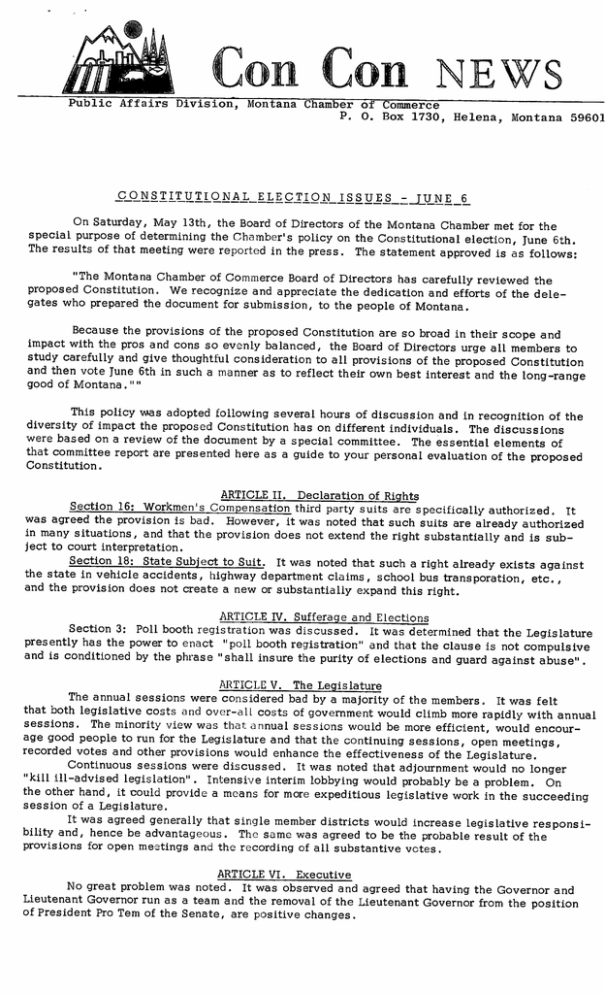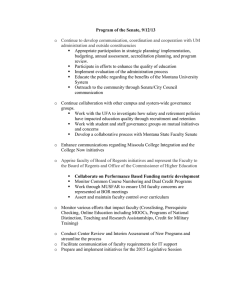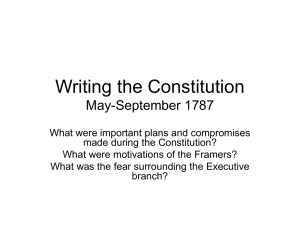On Saturday, May 13th, the Board of Directors... special purpose of determining the Chamber's policy on the Constitutional...
advertisement

Public Affairs Division, Montana Chamber of Commerce P. 0. Box 1730, "~ Helena, Montana 59601 On Saturday, May 13th, the Board of Directors of the Montana Chamber met for the special purpose of determining the Chamber's policy on the Constitutional election, June 6th. The results of that meeting were reported in the press. The statement approved is as follows': "The Montana Chamber of Commerce Board of Directors has carefully reviewed the proposed Constitution. We recognize and appreciate the dedication and efforts of the dele gates who prepared the document for submission, to the people of Montana. Because the provisions of the proposed Constitution are so broad in their scope and impact with the pros and cons so evenly balanced, the Board of Directors urge all members to study carefully and give thoughtful consideration to all provisions of the proposed Constitution and then vote June 6th in such a manner as to reflect their own best interest and the long-range good of Montana."" This policy was adopted following several hours of discussion and in recognition of the diversity of impact the proposed Constitution has on different individuals. The discussions were based on a review of the document by a special committee. The essential elements of that committee report are presented here as a guide to your personal evaluation of the proposed Constitution. ARTICLE II. Declaration of Rights Section 16: Workmen's Compensation third party suits are specifically authorized. It was agreed the provision is bad. However, it was noted that such suits are already authorized in many situations, and that the provision does not extend the right substantially and is sub ject to court interpretation. Section 18: State Subject to Suit. It was noted that such a right already exists against the state in vehicle accidents, highway department claims, school bus transporation, etc., and the provision does not create a new or substantially expand this right. ARTICLE IV. Sufferage and Elections Section 3: Poll booth registration was discussed. It was determined that the Legislature presently has the power to enact "poll booth registration" and that the clause is not compulsive and is conditioned by the phrase "shall insure the purity of elections and guard against abuse" . ARTICLE V. The Legislature The annual sessions were considered bad by a majority of the members. It was felt that both legislative costs and over-all costs of government would climb more rapidly with annual sessions. The minority view was that: annual sessions would be more efficient, would encour age good people to run for the Legislature and that the continuing sessions, open meetings, recorded votes and other provisions would enhance the effectiveness of the Legislature. Continuous sessions were discussed. It was noted that adjournment would no longer "kill ill-advised legislation" . Intensive interim lobbying would probably be a problem. On the other hand, it could provide a means for more expeditious legislative work in the succeeding session of a Legislature. It was agreed generally that single member districts would increase legislative responsi bility and, hence be advantageous. The same was agreed to be the probable result of the provisions for open meetings and the recording of all substantive votes. ARTICLE VI. No great problem was noted. Executive It was observed and agreed that having the Governor and Lieutenant Governor run as a team and the removal of the Lieutenant Governor from the position of President Pro Tern of the Senate, are positive changes. ARTICLE VII. The Tudiciarv Three positive changes were noted: (1) The extension of terms of judges by two years so as to lessen the politics of the judicial system. (2) A great improvement in the justice of the peace courts to the extent that they may possibly be developed into small claims courts. (3) A provision (Section 11), establishing a means for replacing disabled judges. Otherwise, "the Article has no great merit, " ARTICLE VIII. but is no worse than the present. Revenue and Finance It was generally agreed that this section was probably the most controversial. cussion of the sections of this Article were as follows: Dis Section 3: Property Tax Administration. There was great concern expressed about the implications and possible threats and dangers of "state assessment". There was almost as much agreement that the present system works poorly. Section 5: Property Tax Exemptions. The provision l(c) permitting exemption of pro perty from taxation could result in exemption incentives for economic development, the exemption from taxation of property which is expensive and difficult to tax equitably, fairly, or which produces little revenue. It could be used to exempt, for example, homes with a shift of taxes to business, agriculture or some other group. It was noted that the latter possi bility could be accomplished through changes in the classification system under the present Constitution. Section 6: Highway Revenue Non-Diversion. This section was considered to be one of the major weaknesses of the Article. While the section is called "Non-Diversion" the pro visions provide little protection against diversion. It was noted that several editorials and statements have covetously Looked at gas tax money as a source of funding of "priority social needs". The section has no redeeming feature. Section 7: Tax Appeals. The Board of Equalization is abolished as a constitutionally established entity. It would continue to exist and operate by virtue of statute until such time as the legislature abolished it. It was noted that "the present Board of Equalization acts as judge and jury and such a situation is inherently wrong". The section states that "review procedure at the local government unit level" be provided. The establishment of a small tax court would be possible under this section! Section 8: State Debt & Section 10 Local Government Debt. The fear was expressed that under current broad enfranchisement of voters on bond issues, the removal of debt limits on the state and local government would lead to uncontrolled, extravegant bonding. The counter view was that "bonding will run amok is not valid". Reason and the bond market impose discipline and restraint. Section 13: and con. Investment of State Funds. A unified investment program was weighed pro While it was agreed that it could cause problems the general feeling was that the provision might provide better investment of funds and be in the best interest of the taxpaying public. Three deletions from the present Constitution were discussed. State aid to local government could lead to funding of inefficient local governments at increased taxpayer expense. However, it was noted that taxpayers of well run local govern ments would receive equal treatment in receipt of funds and would benefit. Elimination of the Net Proceeds Tax could be considered pro and con depending upon the locality. While valid in certain respects relative to compensation to local government, it is probably not an equitable tax when considered in terms of the interest of ail taxpayers or citizens of the state. Third, there was strenuous objection to removal of the 2 mill state levy and 6 mill uni versity levy provision of the present Constitution. It was felt that it would lead the state to an increasing reliance on a state property tax levy and that the 6 mill university levy removal would lead to more excessive levies. At this point state assessment and a state property tax were reviewed in the context of the Serrano Case. It was stated that Montana's foundation law could be made to comply with the Serrano Case with slight modification and without a statewide levy. It was noted that an individuals views concerning statewide assessment on levies would probably be governed by whether he owned property in high assessment or low assess ment counties and high mill levy/low mill levy areas. A case can be made that state assess- ment and taxation of major plants, utilities and railroads provides greater tax equity than assessment and taxation by and for local government alone. It is likely, however, that for political reasons alone such a system will result in a higher burden of taxation for business. ARTICLE DC: Environment and Natural Resources While business is rightly concerned about provisions contained in this article^ and their possible application by ecology extremists, careful reading fails to show that any new powers or actions are extended or mandated beyond the types of ecology/environmental statutes already enacted. It was generally felt that Section 3, Water Rights, is an improve ment over existing provisions. It was noted that Section 3 is necessary if Montana is to be able to protect our water against downstream appropriation or inter-regional diversion! ARTICLE X: Education & Public Lands The primary area of concern in this article was section 9(2) (a) which gives the new Board of Regents absolute and unchecked control in operations of the university system. Those present felt that the change was necessary from the standpoint that someone needs to control and manage the university system. There was concern, however, that the only legislative control was over total appropriation. There will be no way to directly require the university system to expend funds for the purpose appropriated. important to financing of the current whim". ARTICLE XI; "Funds may be transferred from the Local Government It was agreed that this was the single best article of the proposed Constitution. It offers a real possibility that citizens and taxpayers regain control of Local governmental units and force organizational and operating changes necessary to increase efficiency and effective ness . "It's the best Article of the entire document" . ARTICLE XIII: General Provisions Here on Section 2, Consumers Council stands out in its Anti-Business bias and as testimony of the fanatic tenacity of a vindicative, anti-business delegate. It is inappropriate to the Constitution but must be weighed in balance. The potential for mischief of the section is great and subject only to the common sense of the legislature. A "successor agency" could have far broader jurisdiction than the "public service commission" with the result that the "special tax on the net income or gross revenues of regulated companies" could extend far beyond presently covered business. It should be noted that funding by such a special tax is required, but not limited to the consumer council. However, it should be noted that the section compels the legislature to do what it already has power to do and that the state al ready imposes a multitude of different net and gross income levies on companies of many kinds, for general revenue purposes. Regardless, inclusion of this section is most unfortunate. The final item of discussion was the Committees1 recommendation to the Board of Directors of the Montana Chamber. The consensus of the committee was that there were definite "good points and bad points" . Having presented a "pro and con" discussion of the various issues relating to the proposed document they felt each director must "weigh" the issues and reach his own decision!! CONQR-ES SJL°_NJL.L_ ACTION., PRIVATE PENSION HEARINGS Chairman Wilbur D. Mills (D. Ark.), Committee on Ways and Means, Ue. S. House of Representatives, has announced that the Committee on Ways and Means would begin public hearings on Monday, May 8, *72, on tax.proposals affecting private pension plans, particularly the Administration proposal entitled the "Individual Retirement Act" embodied in HR 12272, introduced by the Chairman and Congressman Byrnes of Wisconsin, at the request of the Adminis tration. According to the letter from the Administration transmitting its proposal HR 12272 would amend the Internal Revenue Code to: (l)establish min imum standards for participation and for vesting of benefits under pension and profit sharing plans; (2) grant deductions to individuals for personal savings for retirement; (3) increase the deductible contribution which may PRIVATE PENSION HEARINGS CONTINUED be made on behalf of self-employed individuals and shareholders-employees of electing small business corporations to a retirement plan which covers them selves and their employees. A print containing the Administration bill and a Treasury explanation of it is available at the Main Committee Office, Room 1.102 Longworth House Office Building. SOCIAL SECURITY UP - TAXES UP The Senate Finance Committee has approved the provision in the House passed Social Security-Welfare Bill, HR 1, to automatically escalate Social Security benefits as the cost-of-living increases, but the Senate Committee would finance these benefit increases somewhat differently than the House. The House version provides for escalating the taxable wage base as wages increase to pay for the cost-of-living increases, thus putting the entire burden on persons earning more than the previous year's wage base. The Senate Finance Committee, on the other hand, would pay for the automatic benefit es calation one-half from raising the taxable wage base and one-half from higher tax rates. On February 23, Chairman Mills of the House Ways and Means Committee introduced H. R. 13320 providing for a 20$ across-the-board benefit increase for all Social Security beneficiaries effective for the month of June, 1972. He suggested that this proposal be considered by the Senate Finance Committee as an amendment to H. R. 1. H. R. 1, as passed by the House, gives a 5% increase. Although H. R. 13320 provides for a somewhat more gradual tax rate increase than does H. R. 1 or the present law, it would mean significantly higher taxes in the near term especially for persons earning more than $10,000 per year and their employers. The taxable wage base would be increased to $10,200 for 1972 and $12,000 for 1973 with automatic adjustments for increases in earnings levels thereafter. ployee to Present law increased the taxable wage base from $7,800 per em $9,000 effective January 1, 1972. WELFARE REFORM On April 7, the Senate Finance Committee decided to delete the provision in H. R. 1, -as passed by the House, calling for a take-over from the States by the Federal government of administration of aid to the aged, the blind, and the disabled. The committee is expected to greatly modify or to simply provide for pilot tests of the Administration proposal for a Family Assistance "guaranteed income" program. NATIONAL HEALTH INSURANCE There are now some indications that the House Ways and Means Committee may wait ■until next year to consider national health insurance in executive sessions, Ways and Means Committee Chairman Mills has indicated that he fore sees the following possible major elements in a bill likely to be developed by the Committee, (I) Replace the present medicaid program with a new program of health care for the poor with a uniform set. of benefits* at least as comprehen sive as those available to middle income groups, (2) Require all employers to provide a basic set of health benefits to all employees and their families largely at employer cost, (3) A system for meeting catastrophic health costs related to taxable income, (4) Extend the purposes of the unemployment com pensation program to include maintenance of health insurance protection during periods of unemployment. Representative Mills proposed that employers* em ployees and the govrnment share equally in the cost of this new feature to the unemployment compensation program, STILL CHANCE FOR CONGRESS TO ENACT EMERGENCY STRIKE BILL THIS YEAR There's still a chance Congress will enact emergency transportation strike legislation this year* possibly as an amendment to some other bill. The most viable proposal appears to be Sen,, Paokwood's Administration backed measure* S.3434, It gives the President three options for dealing with transportation strikes; (I) extend the "cooling-off" period* (2) partial opera tion of the industry* and* (3) final-offer selection, (See feature on Chambers position(l)', S, Chamber) in March 23 issue of Congressional Action.) emergency The Senate Labor Subcommittee transportation strike bills. continues hearings at a slow pace on





